สรุป 12 Tense ให้เข้าใจง๊ายง่าย
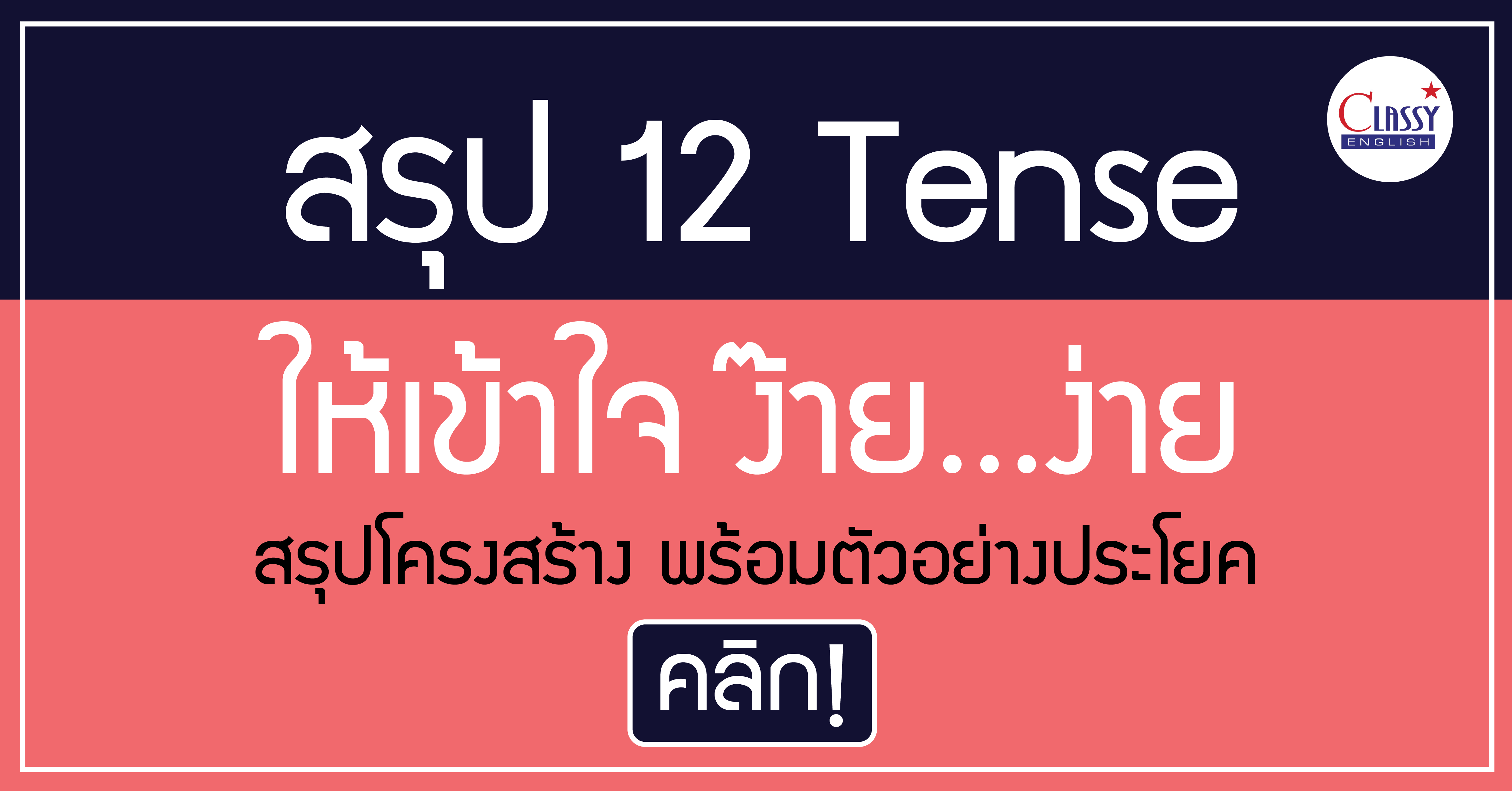
สรุป 12 Tense ให้เข้าใจ ง๊าย...ง่าย
" Past Tense "
Past Tense คือ รูปแบบของคำกริยาที่แสดงถึงเหตุการณ์หรือการกระทำที่เกิดขึ้นในอดีต แบ่งออกได้เป็น 4 รูปแบบ ได้แก่...
Past Simple Tense
ใช้กับเหตุการณ์ที่ทำไปแล้ว จบไปแล้ว
บอกเล่าเหตุการณ์ เล่าเรื่องที่เกิดขึ้นแล้ว มักใช้ในงานเขียน นิทาน นิยายต่างๆ
Form (โครงสร้าง)
S. + V.2
For example:
- I did homework last night.
- last...
- yesterday
- in 1995
- ... ago
- this morning
- the other day
- etc.
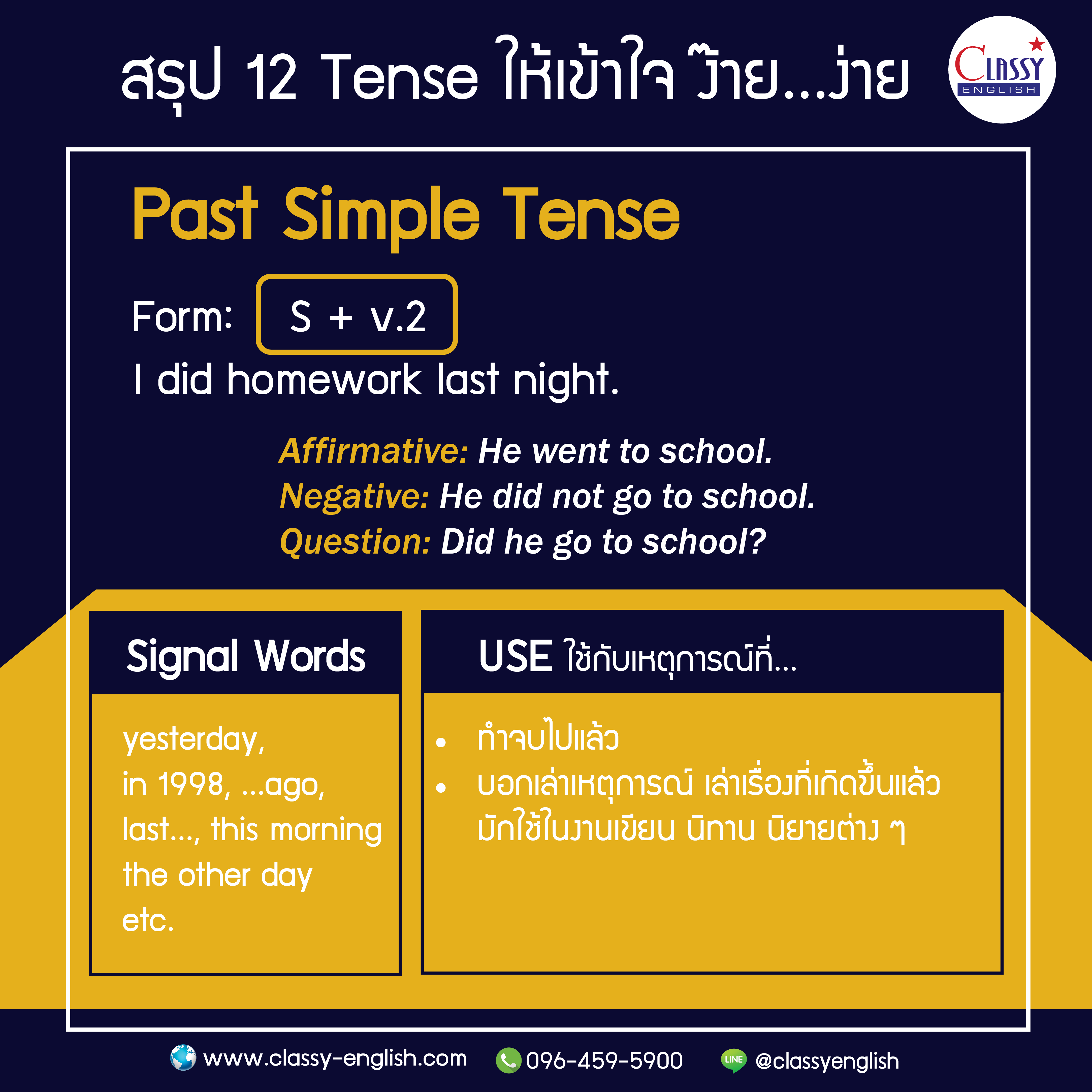
Past Continuous Tense
ใช้กับเหตุการณ์ที่กำลังเกิดขึ้นในช่วงเวลาหนึ่งในอดีต มีเวลากำกับชัดเจน
ใช้กับเหตุการณ์ที่กำลังเกิดขึ้นในช่วงเวลาหนึ่งในอดีต ก่อนจะมีอีกเหตุการณ์เข้ามาแทรก
ใช้กับเหตุการณ์ในอดีตที่เกิดขึ้นในเวลาเดียวกัน
Form (โครงสร้าง)
S. + was/were + V.ing
For example:
- He was talking while the teacher was teaching.
- I was doing my homework when you arrived.
- at this time
- at 8 pm yesterday
- when
- while as
- etc.
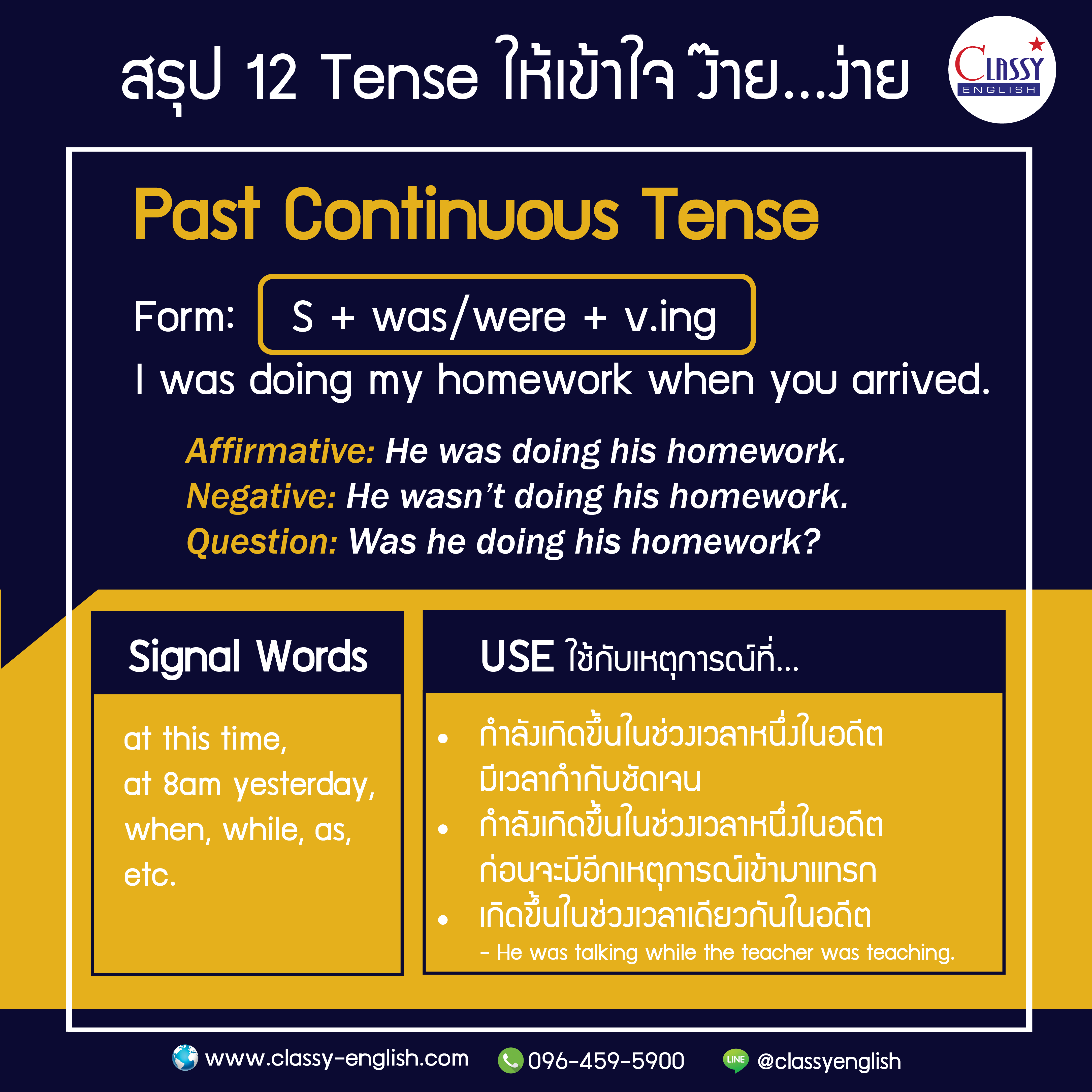
Past Perfect Tense
ใช้กับเหตุการณ์ในอดีตที่เสร็จลุล่วงแล้ว ก่อนจะเกิดขึ้นอีกเหตุการณ์หนึ่ง (มัีกใช้คู่กับ Past simple)
Form (โครงสร้าง)
S. + had + V.3
For example:
- He had gone to school when you showed up
- His phone rang after he has fallen asleep.
- I had finished my homework when you arrived.
- already
- just
- not yet
- before
- after
- until
- when
- etc.
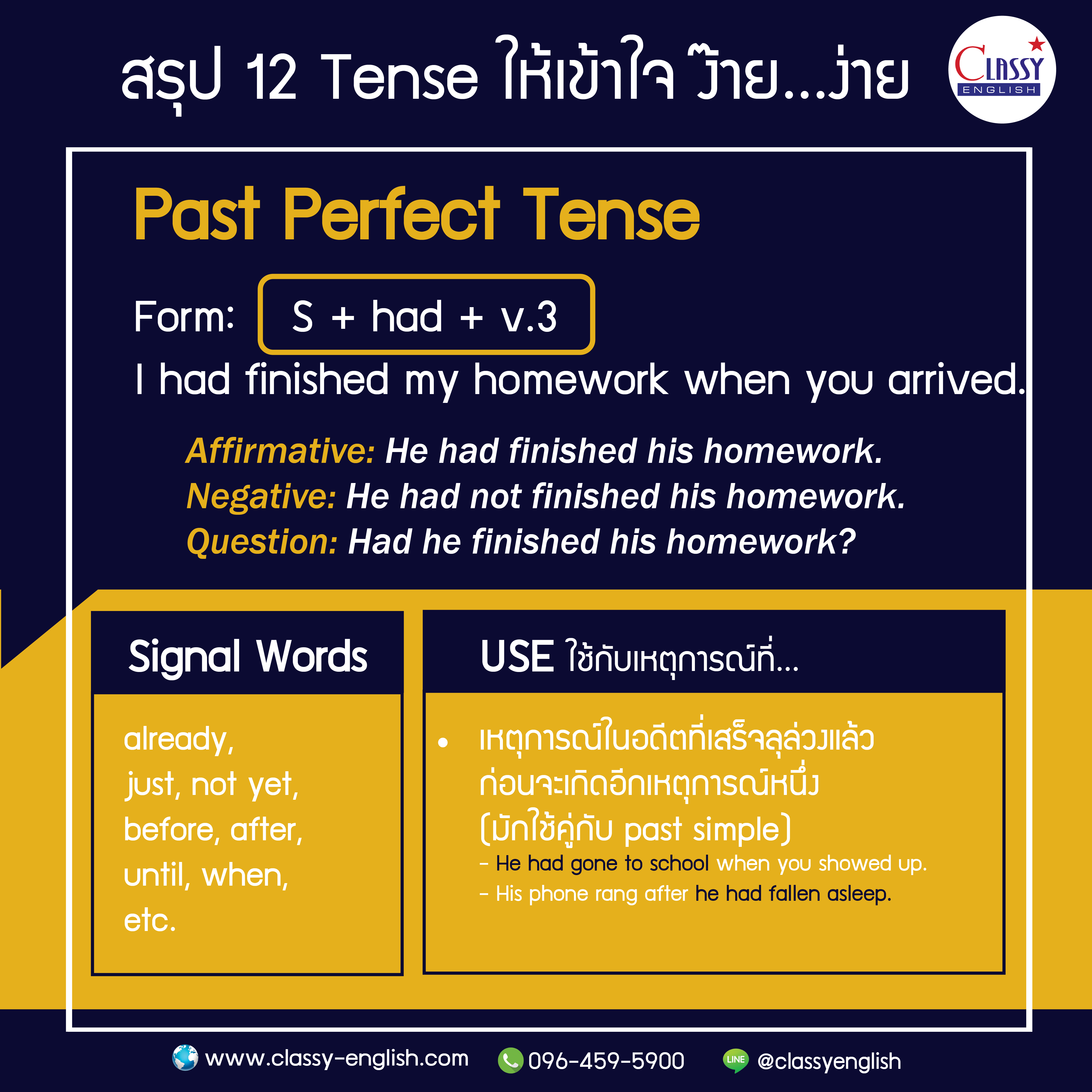
Past Perfect Continuous Tense
ใช้กับเหตุการณ์ที่จบไปแล้วในอดีต ซึ่งเกิดขึ้นช่วงเวลาหนึ่งก่อนจะเกิดอีกเวลาหนึ่ง (มักใช้คู่กับ Past simple)
Form (โครงสร้าง)
S. + had + been + V.ing
For example:
- He had been waiting for 2 hours when his mother picked him up.
- I had been sleeping for 2 hours when you came.
- for
- since
- the whole day
- all day
- etc.
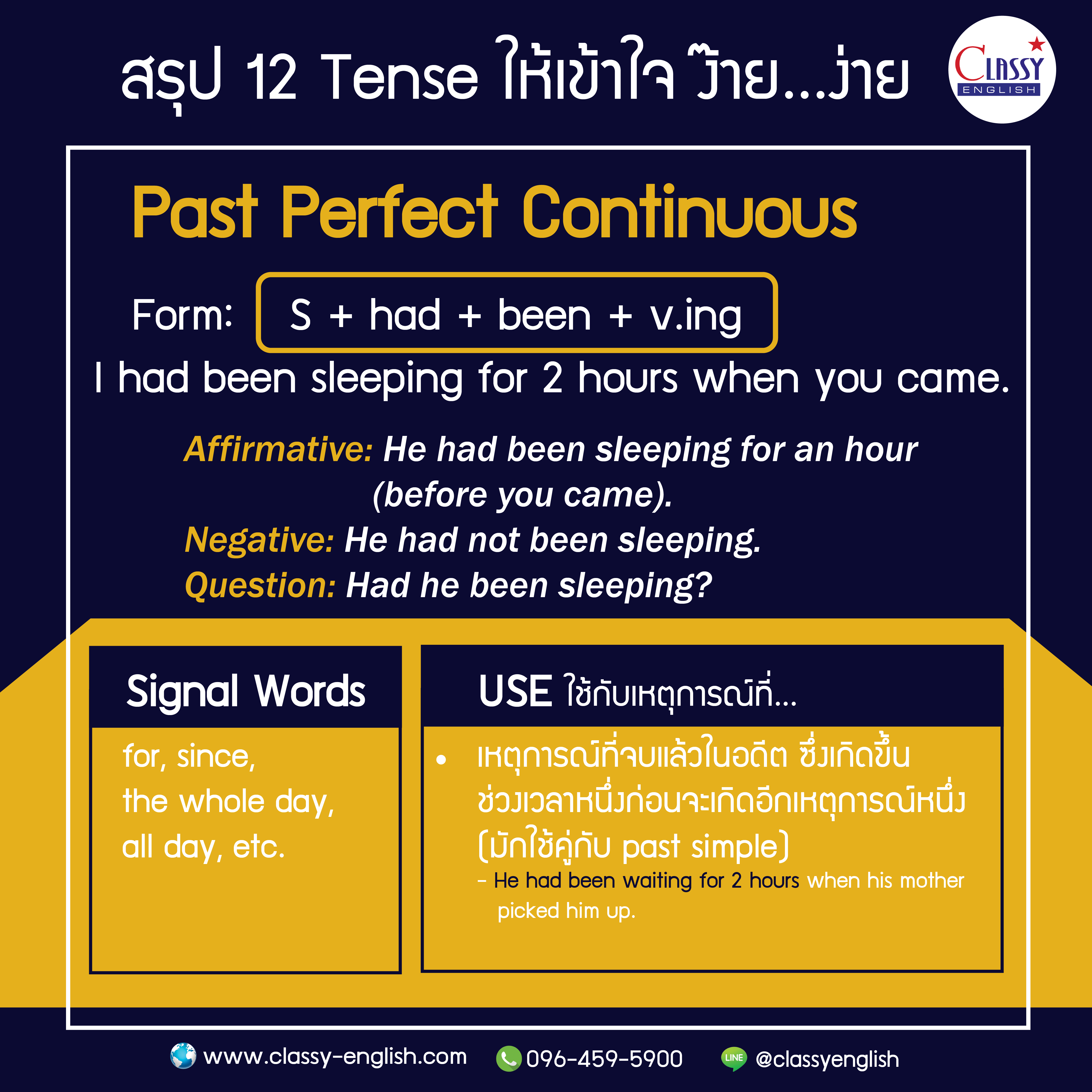
สรุป 12 Tense ให้เข้าใจ ง๊าย...ง่าย
" Present Tense "
Present Tense คือ รูปแบบของคำกริยาที่แสดงถึงเหตุการณ์หรือการกระทำที่เกิดขึ้นในกาลปัจจุบัน แบ่งออกได้เป็น 4 รูปแบบด้วยกัน ได้แก่..
Present Simple Tense
ใช้พูดถึงเหตุการณ์ที่เป็นความจริงหรือข้อคิดเห็น
ใช้บอกเหตุการณ์ที่เกิดขึ้นเป็นประจำ เหตุการณ์ที่ไม่เคยเกิดขึ้น หรือบอกความถี่ของเหตุการณ์นั้นๆ
Form (โครงสร้าง)
S. + V.1
For example:
- I do homework everyday.
- I always go to bed early.
- always
- usually
- every...
- never
- normally
- often
- sometimes
- seldom
- etc.
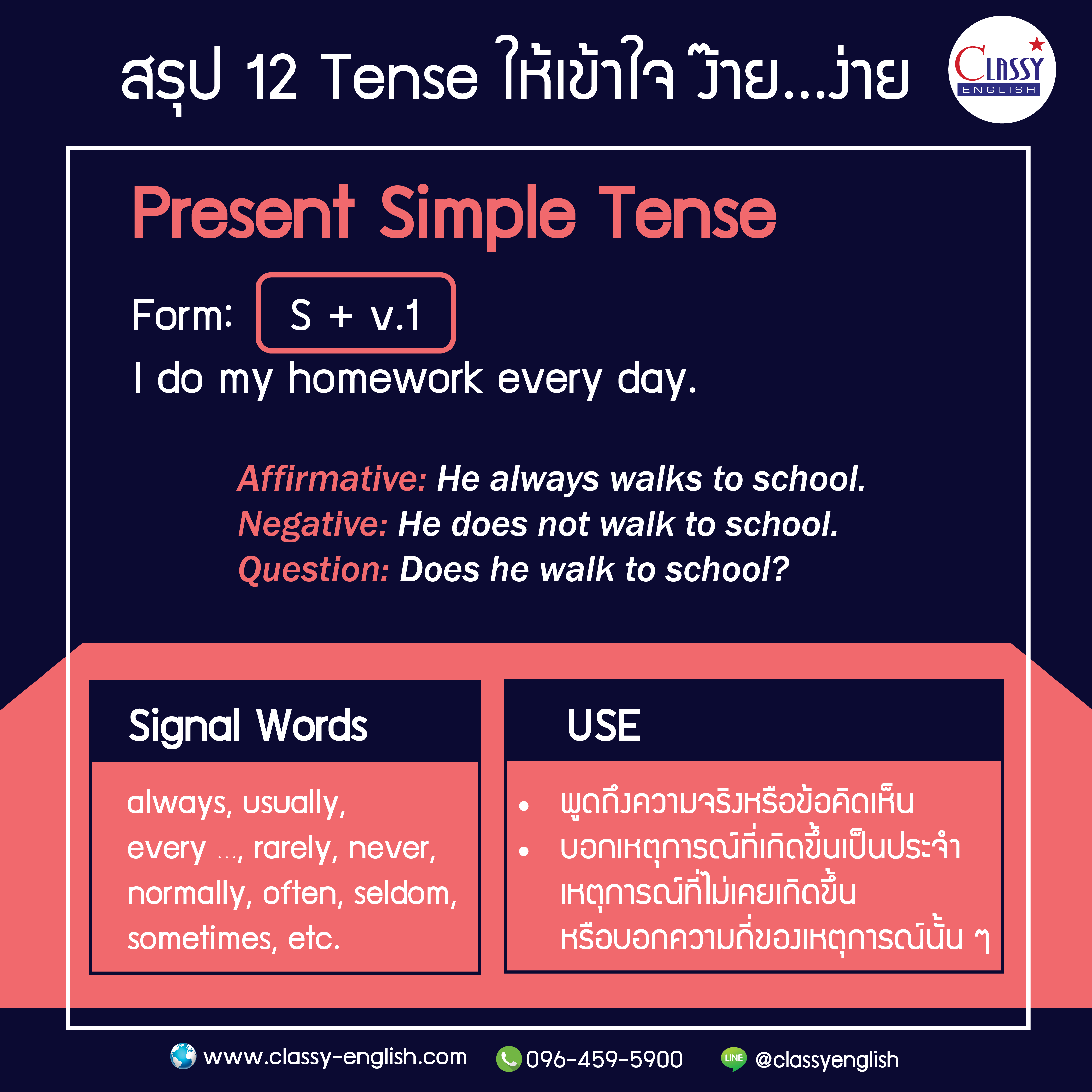
Present Continuous Tense
ใช้พูดถึงเหตุการณ์ที่กำลังเกิดขึ้นในขณะที่พูดอยู่ หรือกำลังดำเนินอยู่ในช่วงเวลานั้น
ใช้พูดถึงเหตุการณ์ที่กำลังจะเกิดขึ้นแน่ๆ (ถูกวางแผนไว้ มักมีคำบอกเวลากำกับ)
Form (โครงสร้าง)
S. + is/am/are+ V.ing
For example:
- I am doing my homework at moment.
- at this/the moment
- now
- Look!
- tonight
- Tomorrow
- this morning
- next...
- etc.
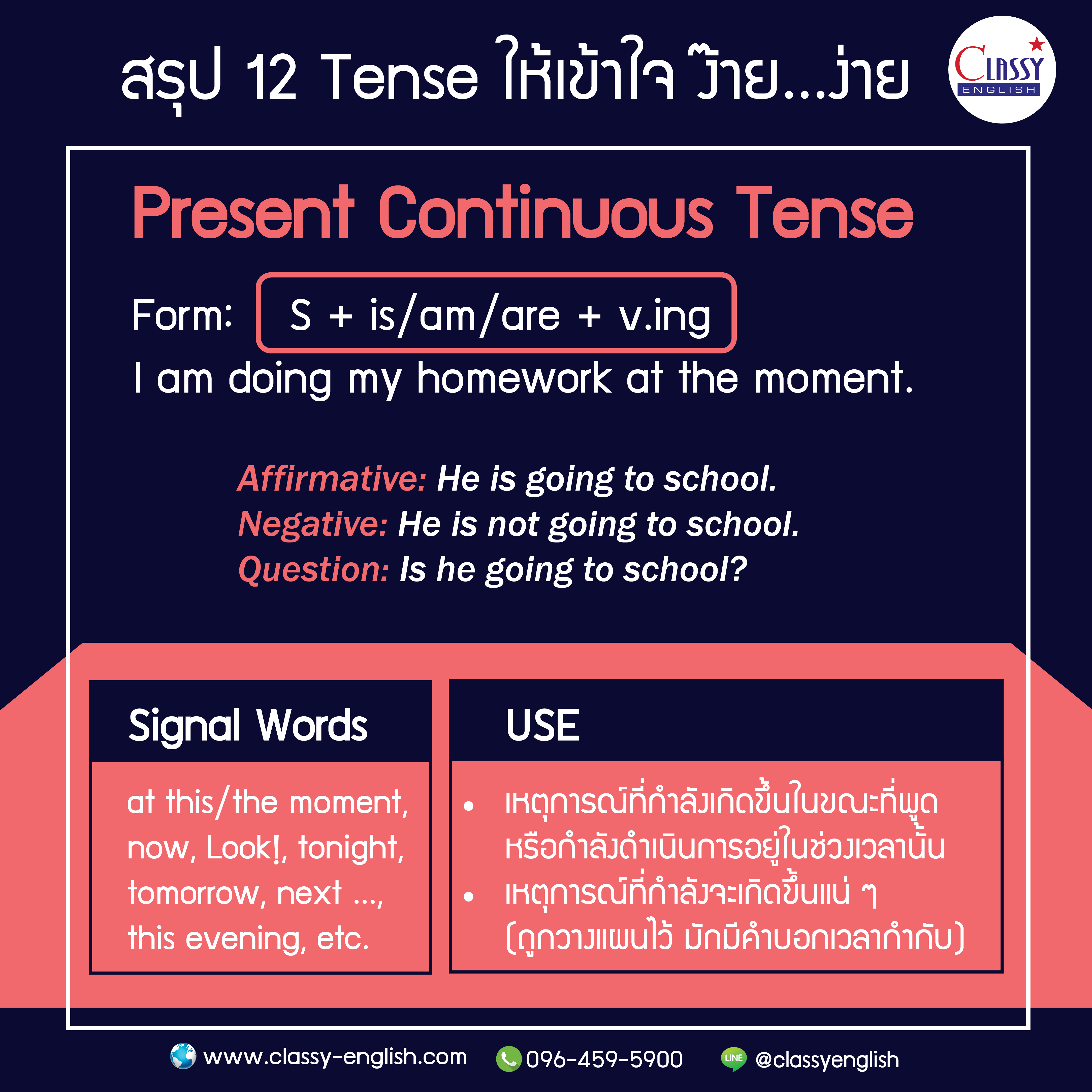
Present Perfect Tense
ใช้พูดถึงเหตุการณ์ที่เกิดขึ้นในอดีต ดำเนินมาถึงปัจจุบันและจะต่อเนื่องไปยังอนาคต
ใช้พูดถึงเหตุการณ์ที่เกิดขึ้นไม่นานมานี้ และเหตุการณ์นั้นจบลงแล้ว
ใช้บอกว่าเคยหรือไม่เคยทำอะไร โดยไม่ระบุเวลา
Form (โครงสร้าง)
S. + have/has + V. 3
For example:
- I have already finished my work.
- for
- since
- already
- just
- yet
- etc.
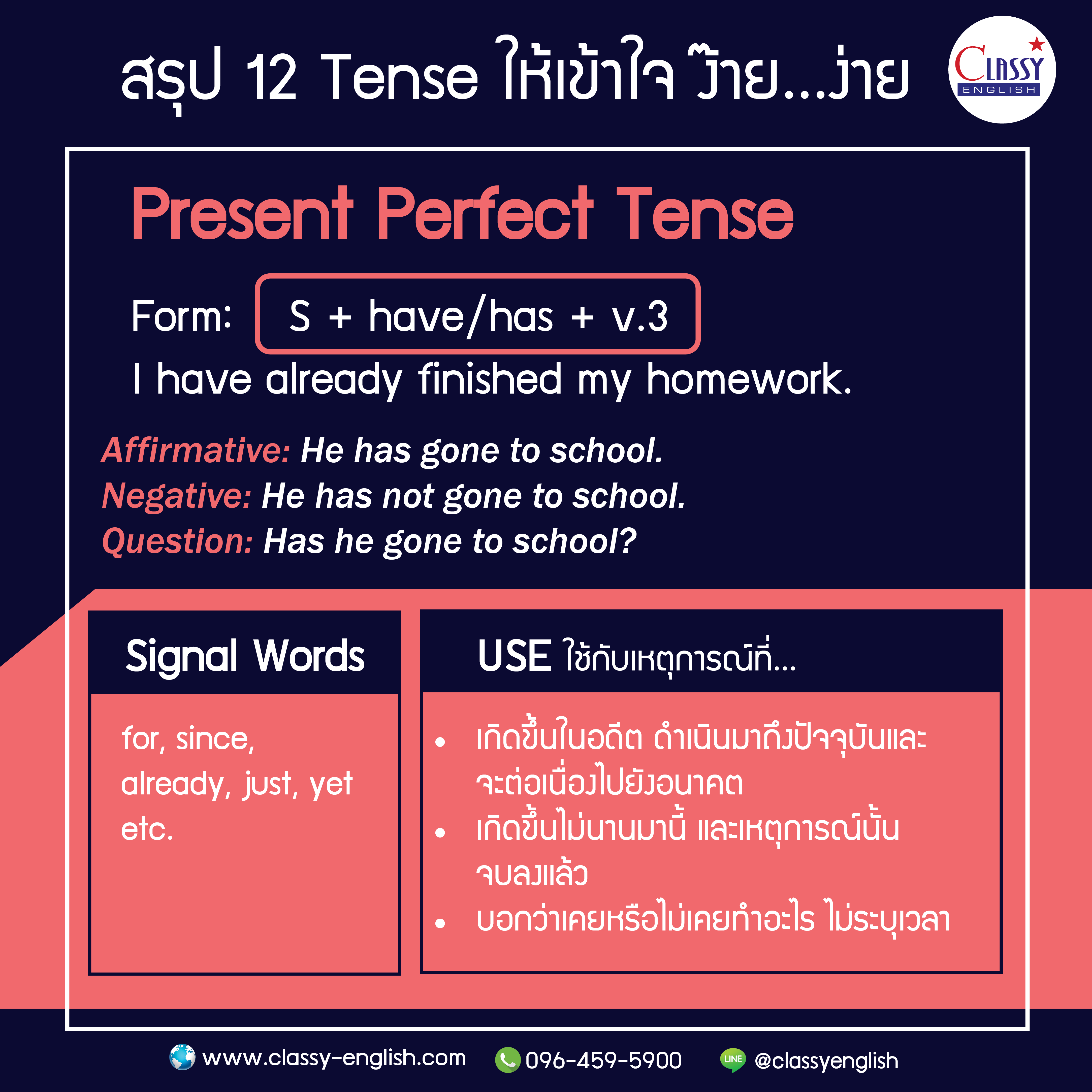
Present Perfect Continuous Tense
ใช้พูดถึงเหตุการณ์ที่เริ่มต้นในอดีตซึ่งดำเนินอย่างต่อเนื่องมาถึงปัจจุบัน
ใช้พูดถึงเหตุการณ์ที่พึ่งกระทำเสร็จไปหรือจบลง แต่เราให้ความสำคัญกับผลที่เกิดขึ้น
S. + have/has + been + V.ing
For example:
- It has been raining all day. (ฝนหยุด แต่ถนนยังเปียก)
- I have been waiting for 2 hours.
- for...
- since
- all day
- lately
- etc.
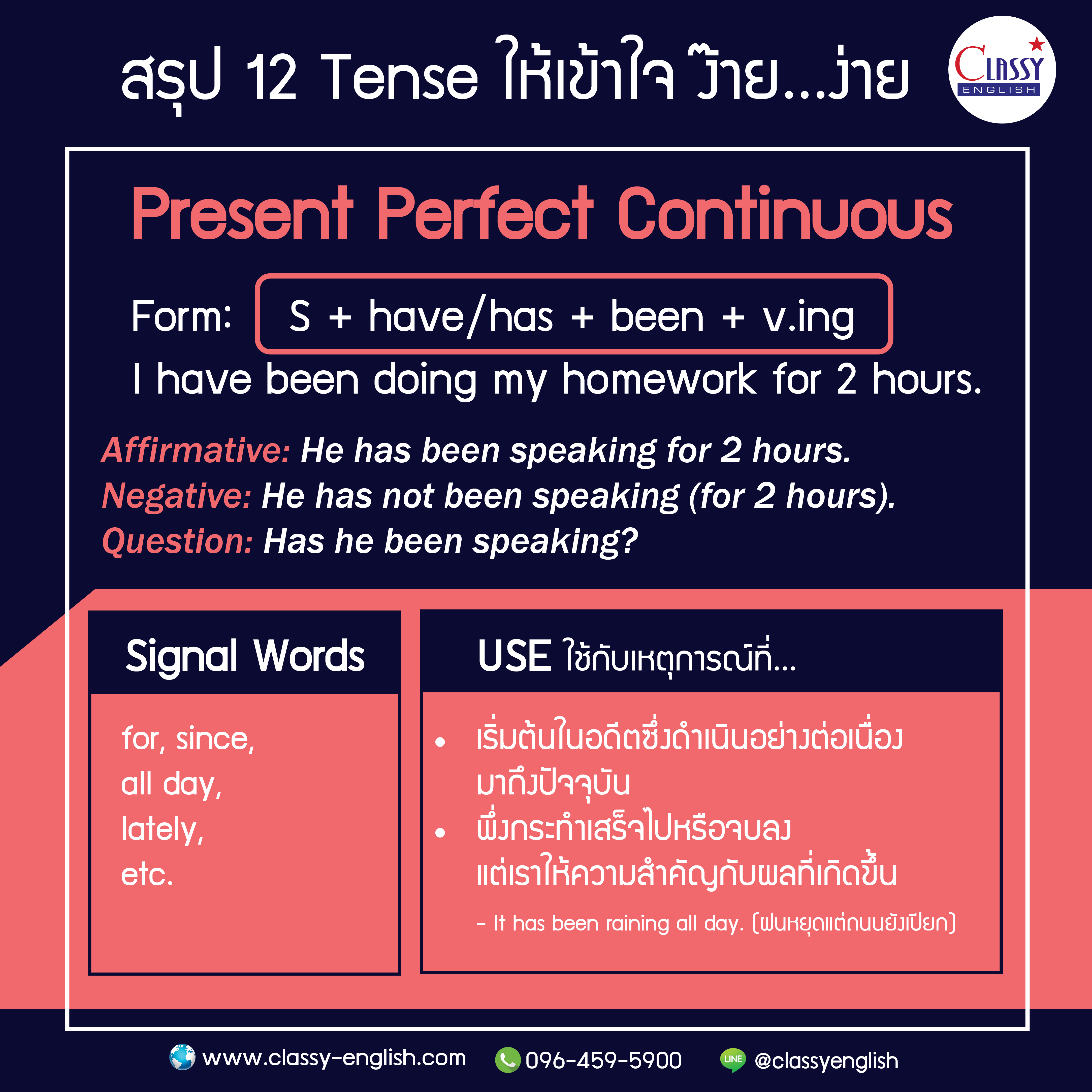
สรุป 12 Tense ให้เข้าใจ ง๊าย...ง่าย
" Future Tense "
Future Tense คือ รูปแบบของคำกริยาที่แสดงถึงเหตุการณ์หรือการกระทำที่จะเกิดขึ้นในอนาคตกาล แบ่งออกได้เป็น 4 รูปแบบด้วยกัน ได้แก่..
Future Simple Tense
ใช้กับเหตุการณ์ที่วางแผนหรือสัญญาว่าจะทำในอนาคต หรือการคาดเดาเหตการณ์ว่าจะเกิดขึ้น
Form (โครงสร้าง)
S. + will/shall + V.1
S. + is/am/are + V.ing
For example:
- I will eat pizza tomorrow.
- I am going to eat pizza for dinner.
- I will go to bed early tonight.
- I am going to do my homework tonight.
- in...years
- next...
- tonight
- this afternoon
- tomorrow
- etc.
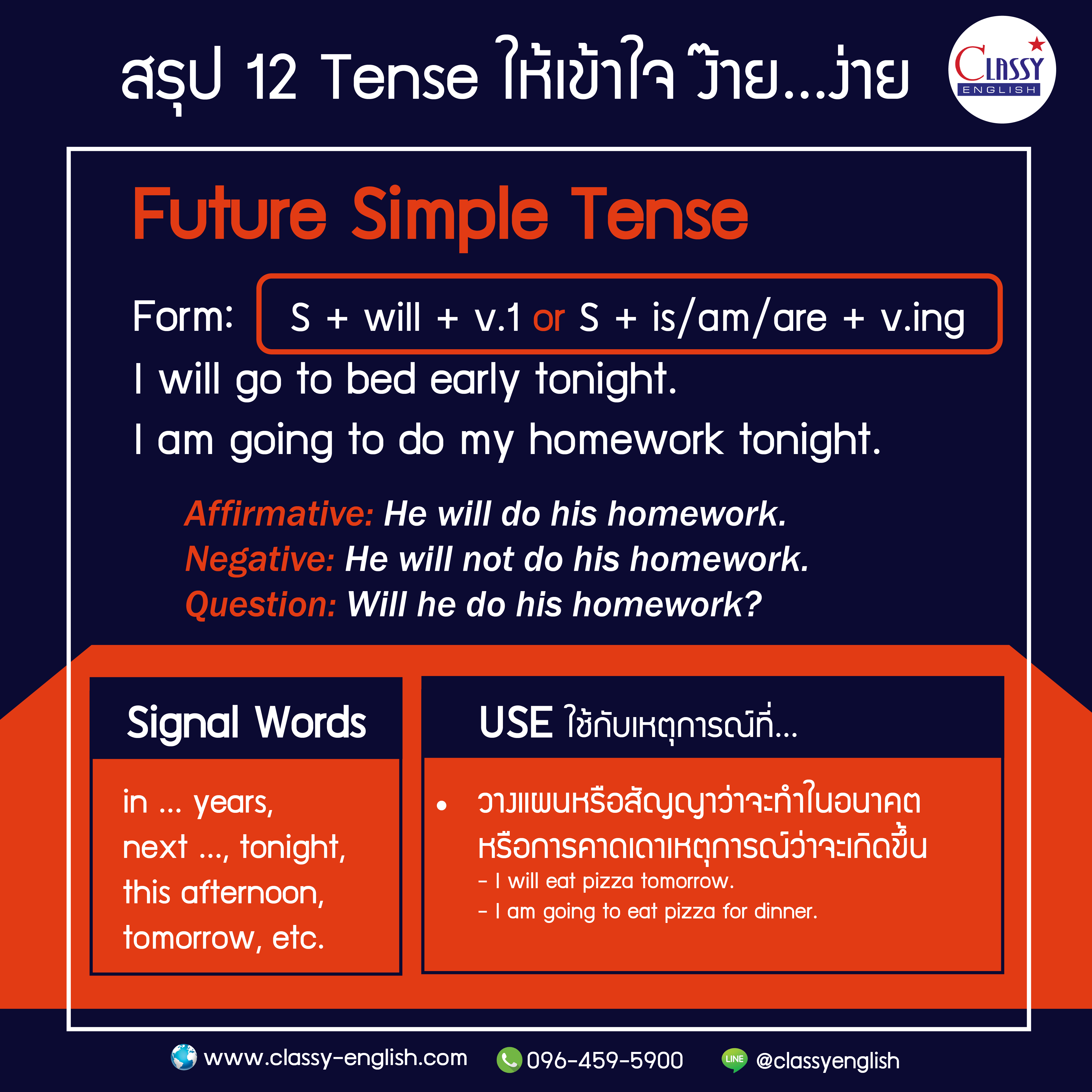
Future Continuous Tense
ใช้กับเหตุการณ์ที่กำลังเกิดขึ้นในอนาคต
หรือในอนาคตที่คาดว่าจะกำลังดำเนินอยู่ เมื่อมีอีกเหตุการณ์นึงเกิดขึ้น
Form (โครงสร้าง)
S. + will/shall + be + V.ing
For example:
- I will be doing my homework tonight.
- At 2 pm tomorrow I will be studying English.
- all day
- the whole week
- at this time tomorrow
- at 1 pm tomorrow
- etc.
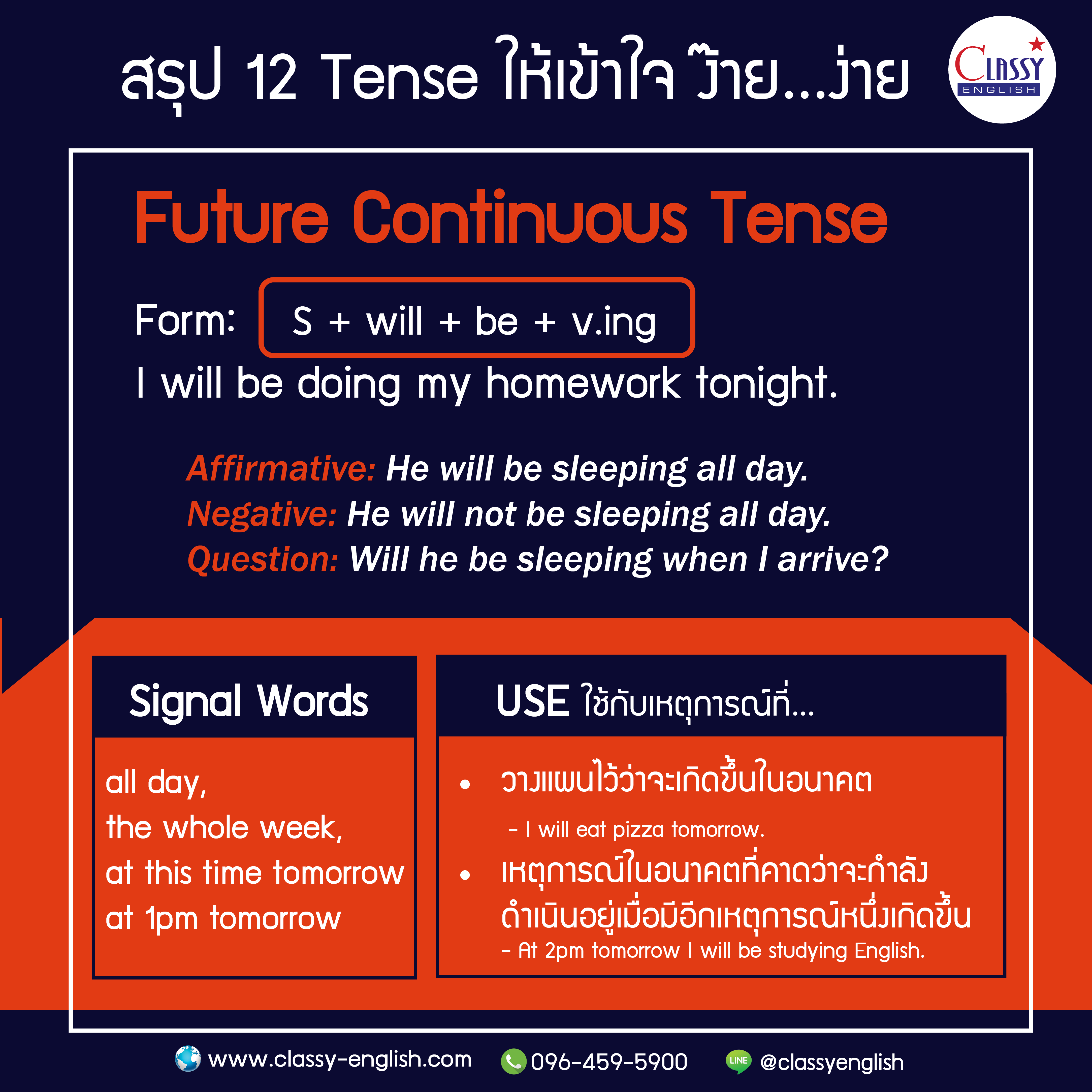
Future Perfect Tense
ใช้กับเหตุการณ์ในอนาคตที่คาดว่าจะเสร็จลุล่วงแล้วก่อนจะถึงช่วงเวลาหนึ่ง หรือก่อนจะเกิดอีกเหตุการณ์หนึ่ง
Form (โครงสร้าง)
S. + will/shall + have/has + V. 3
For example:
- I will have finished my work by tomorrow morning.
- He will have gone to bed by the time she arrives.
- by 9 pm
- by Friday
- by tomorrow
- by the time...
- etc.
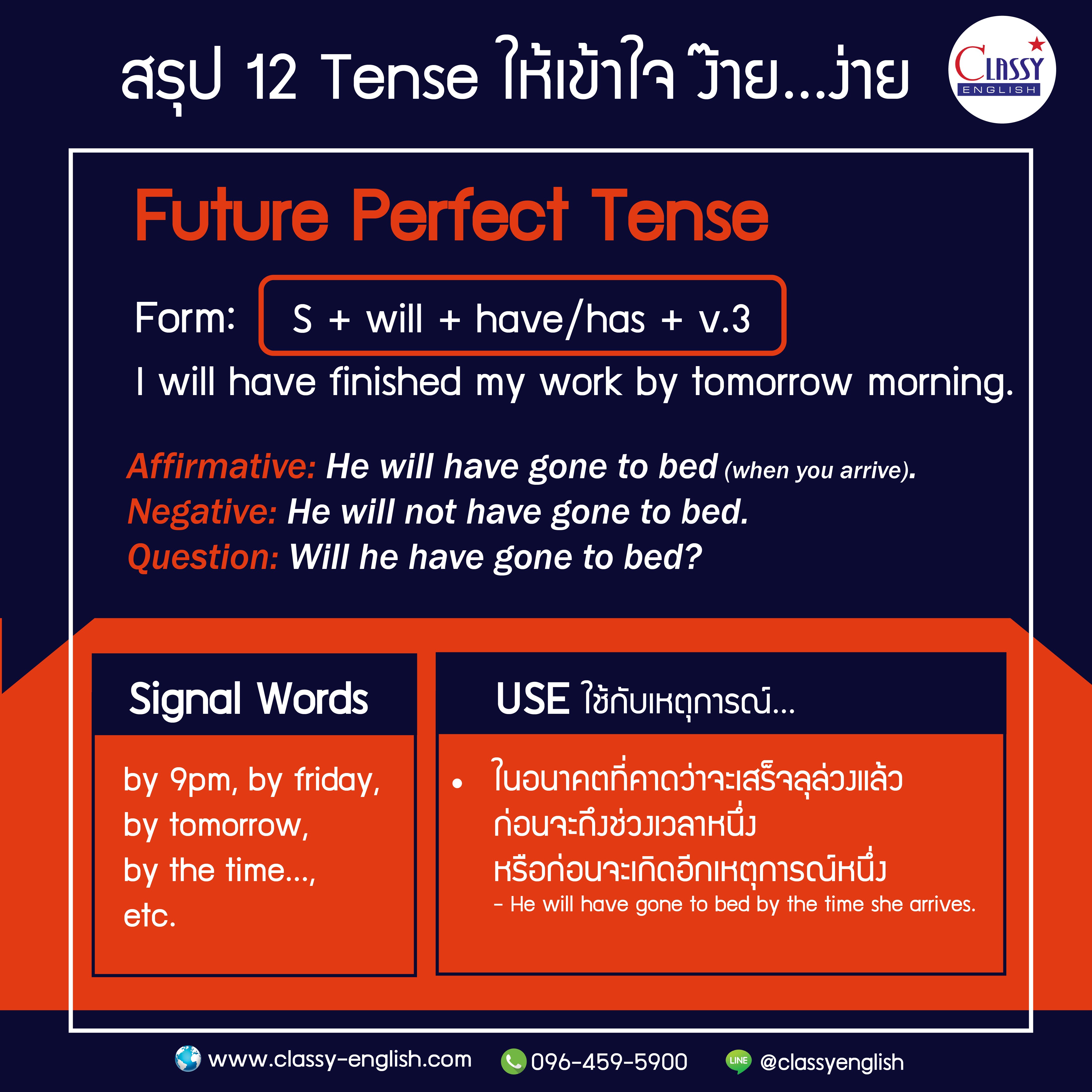
Future Perfect Continuous Tense
ใช้กับเหตุการณ์ในอนาคตที่คาดว่าจะดำเนินไปแล้ว เป็นระยะเวลาหนึ่ง เมื่อถึงช่วงเวลาหนึ่ง หรือเมื่อมีอีกเหตุการณ์เกิดขึ้น
S. + will/shall + have/has + been + V.ing
For example:
- The teacher will have been teaching for 30 minutes by the time she arrives at school.
- I will have been waiting for 2 hours when you arrive.
- for...
- when
- the last couple
- of hours
- by the time
- etc.
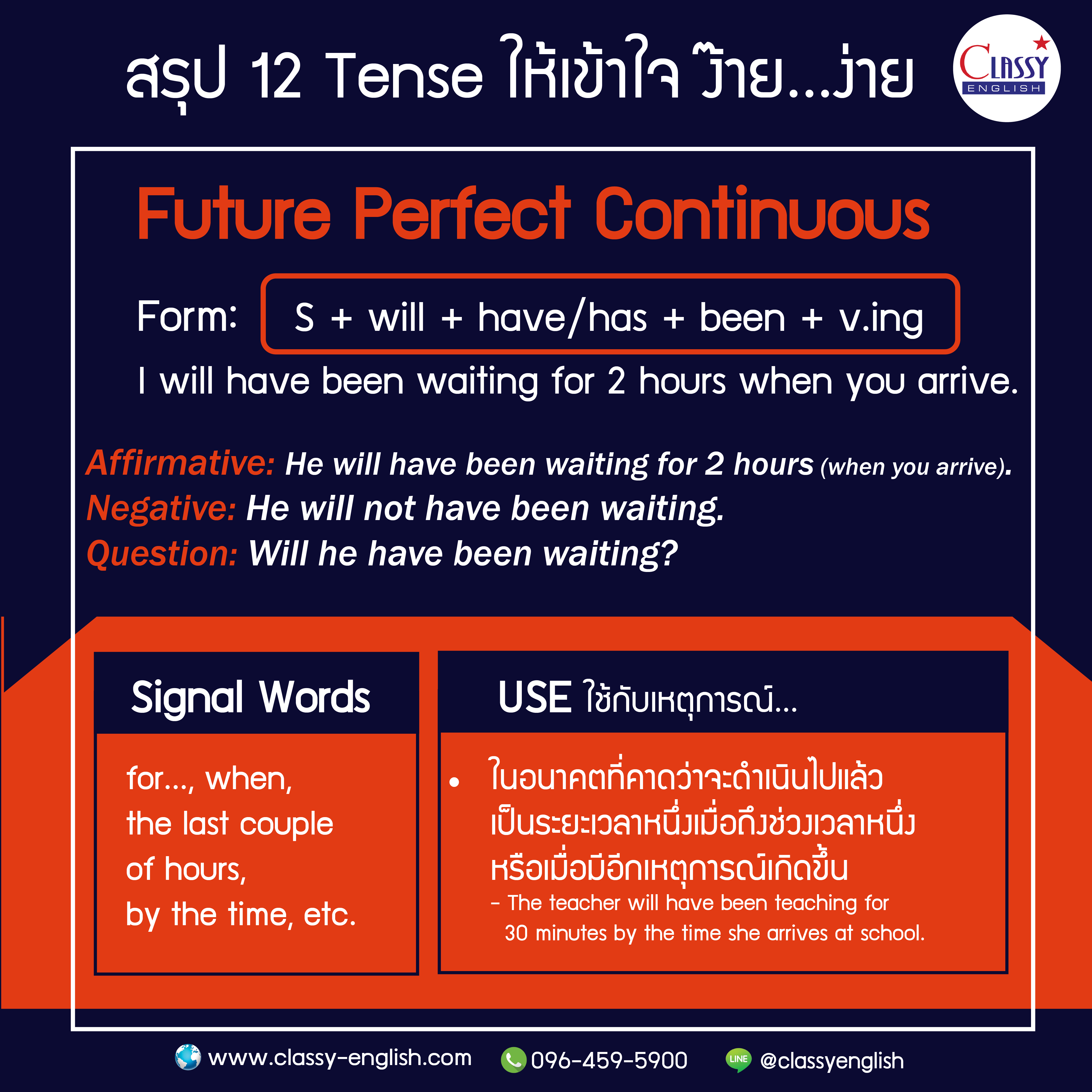
สรุปโครงสร้างและหลักการใช้ Tense , สรุปการใช้ Tense , หลักการใช้ Tense , เข้าใจ 12 Tense , โครงสร้าง Tense , ตัวอย่างประโยค 12 Tense , 12 Tense สรุป , ทำความเข้าใจ 12 Tense , รวม 12 Tense แบบเข้าใจง่าย , Present Tense , Past Tense , Future Tense , Present Simple Tense , Present Continuous Tense , Present Perfect Tense , Present Perfect Continuous Tense , Past Simple Tense , Past Continuous Tense, Past Perfect Tense , Past Perfect Continuous Tense , Future Simple Tense , Future Continuous Tense , Future Perfect Tense , Future Perfect Continuous Tense.




